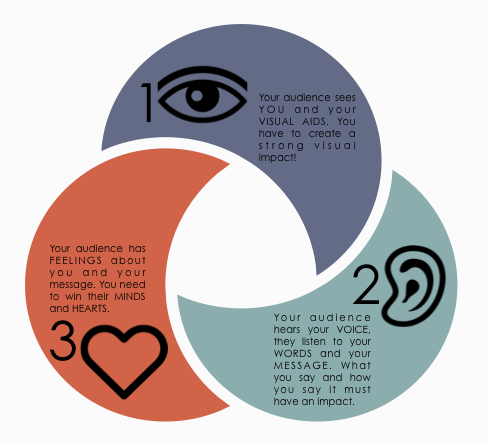“How To Get Real Buy-in For Your Idea”

Alena Huberova, Communications strategist, speaker and trainer
Have you ever finished a presentation with a bad taste in your mouth, asking yourself “What on earth happened? Why did my audience look so indifferent? Why didn’t they ask more questions? Don’t they understand just how important this idea is to the future of this company?!”
Not your fault, or is it?
Blank stares from a tuned-out audience, that’s probably the worst thing that can happen to us when delivering our message. We spend endless hours preparing for our presentation, we’re excited about our idea and convinced it can change the world, yet the response is disheartening. ‘They’ don’t seem to care! But why? And the blame cycle starts…
Is it fair to criticize others for not supporting our ideas? Or does this have something to do with us? My friend, I’ve been there. I’ve been the one pointing the finger at others, blaming them for not paying enough attention to my message. It hit me one day when I looked at my own hand and realized that there were three fingers pointing back at me…
It’s hard to admit it, but in most cases we are the culprits. We either fail to explain our idea in a way that is understandable and relevant to our audience. Or, we fail to excite our audience, build rapport and credibility. Today we’ll talk about the latter.
Your body = Your story
Puzzled? Think about it. Each and every time you walk into a room your body speaks. It tells a story about you to others. You don‘t even need to say a word yet everyone in the room hears your story. Your story is so powerful that it influences how people think of you, how they treat you and how they react to you and your message. Your story determines whether people will like you, trust you and whether they will be willing to support your ideas.
Do you know your story? Does your story grab people’s attention or quite the contrary? If you want to have more impact, you need to understand your story and own it!
We constantly judge each other…
It sounds dreadful but it’s true. It’s not our fault! It’s our reptilian brain in action. When we meet someone for the first time, we perform an instantaneous scan looking for information about them. Our brain captures small cues from the way the person looks, speaks and behaves and in a matter of seconds we make a snap judgment, labeling someone a friend, an enemy, a potential sexual partner or indifferent. When trying to convince a group of investors to invest in your business, being labeled an enemy won’t get you too far.
Yes, first impressions count. Make a great one and the door of opportunity will swing open to you. But that’s only the beginning…
People interacting with you are watching your every move and are continuously evaluating you and making their decisions about how they want to relate to you.
There are three questions on their mind:
1. Do you care about me?
2. Can I trust you?
3. Can you help me?
I want to believe that you do! And that you are competent, have the skills and the knowledge, and that you care! But the question is. Do they know it too? Are you sending the right signals, making people want to work with you? Are you telling the right story?
Key principles to positive influence, on and off-stage
Remember, everything about you – the way you look, speak and behave – transmits powerful signals that are captured by others. If you want to get people interested in your message, you need to make sure that a) they like you and b) they believe in you and your abilities. How? By transmitting signals of strength and warmth.
Professors Amy J.C. Cuddy, Matthew Kohut and John Neffinger studied the signals of strength and warmth and published numerous articles on the topic in the Harvard Business Review. Their studies show that all great leaders transmit both signals and they do so at the same time. Though this may sound easy, it’s not, due to the hydraulic effect between strength and warmth.
If your signals of strength are too intense, people will perceive you as powerful and influential but they may not particularly like you because they will regard you as cold and unkind. If, on the other hand you’re perceived as overly nice and kind, people may see you as someone with no power or influence. Balancing your signals of strength and warmth is the answer. This is especially crucial for women. A lot of strength with little warmth from a man is deemed passable whereas a lot of strength with little warmth from a woman is seen as being too cold and aggressive. You’ll see a concrete example in the section to follow.
You do not know what you do not know…
We tend to be blind to our own signals and that’s a big problem. Awareness is key. Only then you can purposely adjust your signals and own your story!

How do people perceive us?
I remember working with a client, a female finance director of a large corporate firm. She was preparing for her presentation at the company’s annual staff briefing and she was nervous. The rumor in the air said that she wasn’t particularly liked; she was accused of being cold, rigid and unapproachable. I was surprised, that is, until after I saw her in action. I captured her performance on camera. When we looked at it together she broke down in tears. She never realized just how overpowering her signals of strength were. Our mission was clear; to balance her strength with warmth signals. We worked on everything from body posture and gestures, getting rid of her characteristic ‘karate-chops’ and finger pointing; on her emotions to bring a smile to her face, gentle eye contact; we even chose an outfit and accessories that would make her look and feel more relaxed, open and amiable. In terms of content of her presentation, we used storytelling to create an emotional bond with her audience; we also paid extra attention to her use of words and expressions to make sure ‘warmth’ prevailed. The result was spectacular. She enjoyed her performance enormously and even more so the reactions of her peers and team members. Something profound had shifted in their relationship.
This is just an example. Everyone is different. You have to identify your own signals and then adjust the signals accordingly.
You deserve to be heard, go and shine!
I have no doubt that you have great talent, skills and experience. But your talent and uniqueness are worth nothing unless you know how to show them and sell them! You are extraordinary and deserve to be heard!
Go and shine!
By Alena Huberova

